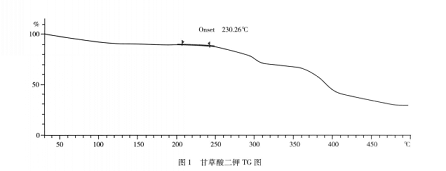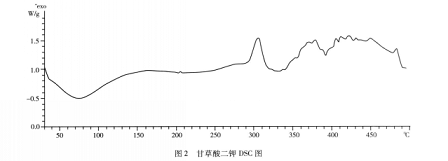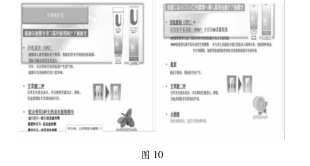Overview【1】【2】【3】
Licorice is a perennial herbaceous plant belonging to the Leguminosae family. It is a medicinal and edible resource. The physiologically active components in licorice mainly include triterpenes, flavonoids and licorice polysaccharides. Among them, dipotassium glycyrrhizinate is the potassium salt of glycyrrhizinate extracted from licorice. It is a natural sweetener and has anti-inflammatory, antiviral, hepatoprotective, detoxifying, and immune function enhancing effects. Compared with sucrose, the sweetness intensity is 80~100 times that of sucrose. As a sweetener, dipotassium glycyrrhizinate has the advantages of high sweetness, low cost and high safety. According to food additive standards, dipotassium glycyrrhizinate can be used as a sweetener in flour products.
Dipotassium glycyrrhizinate is a derivative of glycyrrhizic acid, which has anti-inflammatory, anti-allergic, anti-ulcer, and promotes epithelial cell tissue regeneration. 0.5% dipotassium glycyrrhizinate solution and 0. Dexamethasone 1% had comparable anti-inflammatory effects but no serious adverse effects. Dipotassium glycyrrhizinate is a white powder with high sweetness, good water solubility, low heat energy, low foaming and hemolysis, and is safe and non-toxic. At the same time, dipotassium glycyrrhizinate has the effects of anti-inflammatory, anti-ulcer, antioxidant, antibacterial, wound treatment, and effective scavenging of superoxide ions and hydroxyl free radicals. Therefore, in the cosmetics industry, it can be used in skin care creams, shower gels, freckle creams, facial masks, etc.; in the pharmaceutical industry, it can be used in eye drops and stomatitis ointments; in the daily chemical industry, it can be used in toothpaste, mouthwash, and shaving cream. wait.
The reason why dipotassium glycyrrhizinate has the effects of enhancing immunity, inhibiting inflammation, anti-cancer, anti-virus, anti-stress, activating glucocorticoid activity in the body, and activating the self-repair ability of cells is generally believed to be related to its chemical structure. Licorice Hypoacid itself has a similar structure to steroid hormones, so it plays the role of hormones in the body; and its structure is different from steroid hormones, so there are no serious adverse reactions and side effects of hormones. This conclusion has been confirmed by many research institutions.


Physical and chemical properties
Fine white powder with sweet taste, good water solubility and pure taste.
Purpose【4】
Can be used to produce freckle remover. Anti-allergic agent. The product can prevent the release of histamine, has detoxification, disinfection, and anti-allergic effects, is similar to adrenal sebum hormone, and has no side effects with long-term use. It has antibacterial, anti-inflammatory, detoxifying, anti-allergic, deodorizing and other functions. It can be used for anti-allergic, sunscreen, anti-freckle creams, lotions, etc. The dosage is 0.5% to 1%. Dipotassium glycyrrhizinate has anti-inflammatory, anti-allergic, and moisturizing effects. In the pharmaceutical industry, dipotassium glycyrrhizinate can be used in the production of eye drops and stomatitis ointments; in the cosmetics industry, it can be used in the production of skin care lotions and facial creams; in the daily chemical industry, it can be used in the production of toothpaste; in the food industry, it can be used In the production of potassium supplements, sweeteners, preservatives, and flavorings for sports drinks.
Application of grass products in toothpaste【5】
Glycyrrhizic acid (dipotassium) and glycyrrhetinic acid products are currently used as anti-allergic ingredients in cosmetics and anti-inflammatory and anti-allergic drugs, and practice has proven that the effects are very significant. Similarly, many people with oral and gum allergies are in great need of a toothpaste that can effectively fight allergies without adverse reactions and dependence. In oral medicine, licorice zinc capsules are used in combination with vitamin B 2 to treat oral ulcers and are considered to have miraculous effects. Oral diseases are highly prevalent and attract increasing attention. We also believe that prevention is better than treatment for oral diseases, so a toothpaste that can be anti-inflammatory, anti-allergic, prevent and relieve various oral diseases will be welcomed by many people.
In addition, dipotassium glycyrrhizinate can be used as a safe and efficient natural sweetener to replace sodium saccharin in toothpaste, and its sweetness is 300 times that of sucrose. Currently, oral care products on the market include Helus periodontal ointment from Japan’s Lion King, Germany’s Grant-Gelclair (oral ulcer drug), Angileptol oral care solution from Sigma-Tau Pharmaceuticals, Neo-Stomygen toothpaste from Gruppo Stomygen, and Italy’s Aventis. Fluocaril anti-allergic toothpaste, GlaxoSmithKline’s periododentyl anti-allergic toothpaste, Japan’s Youhao Tooth Oral Care Toothpaste, and the domestically well-known Yunnan Baiyao’s anti-allergic toothpaste. The recommended amount of dipotassium glycyrrhizinate in toothpaste is 0. 1% ~ 0. 5%.

Purity test【6】
(1) Dissolve 1.0 g of this product in 20 ml of water. The liquid will be colorless or slightly yellow and clear.
(2)Heavy metals: Take 2.0 g of this product and moisten it with a small amount of sulfuric acid and set it at 450-500. Burning to ashes. Add 2 ml of dilute acetic acid to the residue. After heating and dissolving, add water to 50 ml. This is used as a test solution. When tested according to Method 4, the limit is 10 ppm or less. For the comparison solution, take 2.0 ml of lead standard solution.
(3) Arsenic product O. Add 10 ml of nitric acid and 5 ml of sulfuric acid to 50 g, and heat carefully. If the liquid is not colorless to slightly yellow, after cooling, add 2 to 3 ml of nitric acid each time, and heat until it is colorless to slightly yellow. After cooling, add 15 ml of saturated ammonium oxalate solution, heat until white smoke is produced, add water to 20 ml after cooling, and use it as a test solution.Use device C and perform the test as described above. The limit is 4 ppm or less.
Preparation
Using licorice as raw material, it is extracted with water and then completely neutralized with potassium hydroxide or potassium carbonate.
References
[1] Dou Kangning, Ren Jingli, Wang Zhaocai, Pan Meiling, Yue Xiaoyan. Research on the effect of dipotassium glycyrrhizinate on flour quality [J]. Grain Processing, 2016, 41(06): 21-23.
[2]Wan Xiuyu, Zhu Qideng. Development of dipotassium glycyrrhizinate eye drops[J]. Food and Drugs, 2008(11):18-20.
[3] Zheng Xiaoxia, Xie Xiaofang. Research on the anti-inflammatory effect of dipotassium glycyrrhizinate and its application in toothpaste[J]. Oral Care Products Industry, 2017, 27(05):18-21.
[4] Compiled by Shanghai Potash Engineering Technology Research Center, Overview of China’s Potash Industry, Shanghai Jiao Tong University Press, 2009.07, page 99
[5] Chen Baohua, Chen Jianfen, Chen Guobao. Overview of the application of dipotassium glycyrrhizinate in the prevention and treatment of oral diseases [J]. Oral Care Products Industry, 2017, 27(05):13-17.
[6] Compiled by Song Guoai et al., Technical Standards for Cosmetic Raw Materials, China Light Industry Press, 1st Edition, April 1994, Page 342

 微信扫一扫打赏
微信扫一扫打赏

